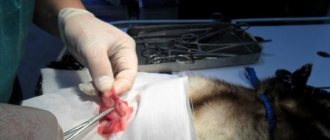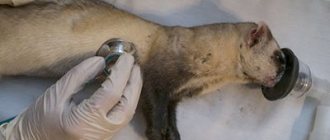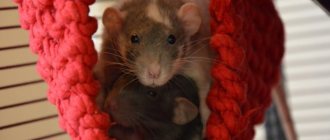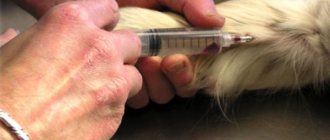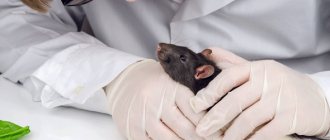Castration and sterilization of decorative ferrets
The owners are accustomed to comparing these definitions. In reality these are different operations.
Castration is “emasculation” (from the Latin castratio). In other words, this is the removal of reproductive organs. Conducted by veterinarians. The result of the procedure is that the animals cannot have offspring. Sterilization is “infertility.” Animals cannot reproduce their own kind, but the genitals remain in their places. Hormone levels remain unchanged (unlike castration). During the sterilization operation, the males' spermatic cords are ligated.
Life of a ferret after castration
Castration will have a positive effect not only on the ferret’s health, but also on its overall quality of life. The male will again become playful, affectionate, obedient, cheerful, aggression will disappear, the smell of the skin and hormonal levels will normalize, and sexual desire will no longer bother him.
Castration will not affect your ferret's activity or weight in any way. He will continue to be active throughout his life and will remain at his normal weight. Neutered ferrets will not be lazy and put on weight like cats.
In addition, the risk of cancer and adrenal gland diseases in the animal will decrease, and according to statistics, life expectancy will also increase.
Why spay/neuter your ferrets?
If the animal is in heat, it will not end until the ferret mates. During this period, the hormonal background of ferrets changes, this affects the condition:
- weight decreases sharply;
- the ferret starts to get sick;
- the fur peels off and becomes greasy;
- the animal itself smells bad (there is the smell of urine).
Surgeries are necessary to protect the ferret from the negative effects of estrus. If the operation is delayed, the pet will become bald, apathetic, and internal bleeding is likely to occur.
Points for and against
Many owners put forward only one argument against the operation - a cruel approach to the animal. In addition, he will not be able to have offspring.
Veterinarians advocate for the procedure to be carried out. According to their judgment, depriving an animal of the sex glands is much more humane than giving the ferret the opportunity to constantly suffer from hormonal imbalances.
Breeders who can't decide whether to castrate their ferret or not can familiarize themselves with the pros and cons of the procedure. This will help them make the right decision.
Positive aspects of the procedure:
- males stop marking territory and smell unpleasant;
- ferrets become calm, they are no longer looking for a partner;
- the fights taking place between the ferrets subside;
- The life expectancy of the animal increases significantly.
The only negative factor can be attributed to the fact that complications are likely after the procedure.
Contraindications
Since castration and sterilization are surgical operations, the procedures have their own contraindications. Before going to the doctor, the owner should familiarize himself with the rules of the procedure.
Which ferrets should not be neutered:
- for adult animals, because anesthesia is administered, and an elderly heart may not withstand such a load;
- If we talk about chemical castration, then it is worth limiting those who have impaired liver function.
Before the operation begins, the veterinarian performs a thorough examination.
Why is castration necessary?
Veterinarians advise neutering all pets, but the final decision is made only by the owner. The only exceptions are those animals from which it is planned to obtain offspring.
Castration of ferrets is a preventive operation that allows not only to preserve, but also to prolong the life of the pet.
When a ferret reaches puberty, hormonal changes begin in its body. This period is extremely dangerous for the pet’s life and unpleasant for its owner:
- Females begin to go into estrus, which continues until pregnancy. With a long absence of mating, she develops anemia, decreased immunity, weight loss and baldness. If you do not resort to the necessary surgery, the pet may die.
- Males enter a period of sexual hunting, called the rut. The animal becomes restless and hostile towards others. In search of a female, it can run away from the house or even jump out of an open window. The rutting period lasts from six months to a year. It is worth noting that to calm down the male needs to carry out at least 4 matings, with different females. Lack of mating can lead to hair loss in your pet. As a result of hormonal imbalance, problems with the adrenal glands and prostate often occur.
- The ferret becomes an obnoxious “neighbor” for its owner. His fur becomes greasy and smells unpleasant. The animal becomes aggressive, bites, begins to mark territory in inappropriate places, and refuses to relieve itself in the tray. During a prolonged rut, the male may look for a replacement female in pillows, blankets, toys, and even the legs of the owners.
After the operation, the health and behavior of the animal is completely normalized. The only exception can be ferrets that have survived the first rut.
The benefits of castration are obvious, given that the risks of developing postoperative complications are minimal.
Age of ferret for castration
Experts say that the ideal period is between six months and 10 months. During this period of time, the animals actively begin to show primary signs of sexual maturation.
To more accurately determine the timing of when surgery is needed, the owner should watch the animal a little. You can contact a doctor if the male begins to leave marks in the room. Females begin to go into heat.
It is not recommended to remove glands at too early an age. At this moment, ferrets are actively developing their genitourinary system.
What types of castration are there for ferrets?
The most popular and effective methods of castration of ferrets are chemical and surgical.
Chemical castration of ferrets
Chemical castration is a relatively new method, but already quite well known. The procedure involves an injection of a hormonal agent or implantation of an implant.
Benefits of chemical castration:
- There are no marks or scars left because the implants are inserted using a fine needle.
- Can be done at home. The ferret will be less nervous than when traveling to the clinic, and will tolerate the injection more easily.
- General anesthesia is not required.
- Convenient for emergencies when surgery is not possible.
Disadvantages of chemical castration:
- After the end of the hormones, the rut will begin again.
- The high cost of the drug.
- Injections will have to be done throughout your life, every 1.5-2 years.
- There is no guarantee that the rut will not start earlier.
Despite being somewhat expensive, chemical castration of ferrets has many supporters both among veterinarians and owners. After all, the health of a pet is worth more than any money. In addition, violent intervention in the body is excluded; the method is considered to be the most humane.
Surgical castration of ferrets
Surgical castration is the traditional method. Can be performed by any veterinarian who has similar experience. The technique of castrating a ferret is completely simple. An incision is made in the scrotum and the testes are removed through it. After castration, stitches are not required. The wound heals in about 7-10 days.
Advantages of surgical castration:
- The ferret castration operation is performed once.
- The owners are forever freed from the ferret's problematic behavior.
- If castration is carried out correctly, no unpleasant consequences arise.
Disadvantages of surgical castration:
- A scar 4-6 mm long remains on the scrotum.
- The postoperative period sometimes requires the use of antibiotics and healing agents.
- You will have to watch the wound for some time and stop swimming for at least a week.
Postoperative rehabilitation is individual for each animal. Some people get up after 5-7 hours and demand something tasty. Others need two to three days to recover from surgery. It is very important to observe your ferret's behavior after castration. If the animal does not return to its usual behavior, its condition is sluggish, apathetic, then you should immediately call the veterinarian. Practice shows that this usually does not happen. And complications after castration occur in only 1% of ferrets.
You need to know that if a male ferret has had a rutting period at least once, then even after castration his behavior will periodically change. True, not much. If you castrate an animal before the first rut, then for the rest of its life it will be good-natured, playful and affectionate.
On the other hand, it is recommended to castrate the ferret at the beginning of the first rut. Because if he is still growing, gaining muscle mass, and has a not fully developed skeleton, then early castration of the ferret will lead to a stunting of his growth and problems with the adrenal glands.
Experts recommend carrying out the procedure after reaching 8-9 months to be sure that the animal has matured.
Castration of a male
7 months after birth, males begin an active, noticeable rut (activity characteristic of mammals at the peak of puberty). Duration from six months to one year.
Even if the ferret has had sexual intercourse, he will not stop. His body will require intimate relations at least 4 times, and the same female will not be suitable.
To avoid negative consequences, the testes are removed.
Experienced veterinarians advise resorting to surgery even before the very first rut, but not before the time when the testes are fully formed.
Preparing for surgery
It doesn’t matter whether castration or sterilization is ahead, it is best to prepare the animal for surgery in advance. The following is taken into account:
- 7 days before going to the veterinarian, it is necessary to monitor the ferret’s health status (using tests);
- 8 hours before the procedure, deny the animal food, stop giving it water 2 hours before;
- cleanliness in the room is an important component;
- change the mat in the cage;
- food and water are not allowed in the place where the ferret lives;
- a towel or blanket should be at hand; take it with you to the clinic.
After the operation, the animal should be denied food and water.
Castration of animals is carried out exclusively under general anesthesia. The process takes half an hour. The best time for surgery is in the morning. After waking up from sleep, the ferret tolerates fasting more easily:
Postoperative care
You can feed the animal only a few hours after the end of the operation, as the body must recover from anesthesia. Because of this, problems in the functioning of the gastrointestinal tract may begin. If your ferret has been constipated for several days, you should give a few milliliters of petroleum jelly.
For about a week, you cannot bathe the animal, and you need to make sure that water does not get on the seams. It is advisable to limit movements (you can lock the ferret in a cage). The cage should be dry and clean so that the animal does not start licking its wound; it can be covered with a blanket (it can be easily made from a sock or a piece of dense fabric). A dry wound is treated with brilliant green. If the sutures come apart, you should immediately notify your veterinarian, he will advise you on further actions.
Estrus and spaying in a female ferret
Female ferrets begin their first heat at 7-8 months, but not later. The best time for the procedure is the period of the first estrus.
The maximum limit when an animal should be shown to a veterinarian is 1-2 weeks from maturity. The first sign of estrus is an increase in the size of the loop.
Removing a female from a prolonged estrus
In case of prolonged estrus, 30 days after the start of the rut, the animal quickly loses weight. If this is noticed, then before the operation you will have to donate blood for a general analysis. If the procedure is contraindicated or it is already too late, then there are temporary measures:
- mate a female ferret with a previously sterilized ferret - the process will cause ovulation and false pregnancy;
- a special drug “Khorulon” - it will also lead to false ovulation (the product can be used only once in the entire life of the female).
After using the drug, the female should undergo surgery to remove the uterus (there are no contraindications).
Sterilization of a female (fert)
There is an opinion that it is best to sterilize females after she has given birth one day. Based on the studies conducted, it was found that females who were operated on before giving birth live many times longer.
Before you go to the veterinarian with your ferret, you have to prepare for the operation. The algorithm of actions and rules are exactly the same as when operating on a male.
Females are sterilized in several ways:
- uterine tube ligation;
- oophorectomy - removal of the ovaries;
- Ovariohysterectomy means removal of both the ovaries and the uterus.
Removing the uterus along with the gonads is the most optimal solution. The ferret will forever forget what estrus is. The animals tolerate the operation well; the procedure takes 20 minutes. General anesthesia is used.
The incision that was made to remove the glands is small. Only 1.5 cm. The resulting sutures are removed after a week (if the doctor did not use silicone threads that dissolve on their own).
Often the perianal glands are removed during surgery.
The ferret recovers from anesthesia in about 3 hours without feeling any pain or discomfort.
Chemical sterilization of a female
Chemical sterilization is used by those owners who do not want to deprive their ferret of the opportunity to become a mother. The essence of the procedure is that an injection is administered that reduces the activity of the genital organs.
The injected drug causes a surge of peptide hormone. In this way, veterinarians are able to stop the ferret from going into heat.
The procedure has several disadvantages:
- after some period of time, the estrus will repeat again and the drug will have to be administered again;
- it is possible that a false pregnancy will occur;
- the procedure is expensive.
Chemical sterilization can be carried out using an implant. It is introduced into the subcutaneous covering of the animal with a needle. The rut stops after 30 days. The drug has an effect for exactly 2 years.
The animal feels great after the procedure.
It is not recommended to do chemical sterilization yourself. Only an experienced doctor can decide whether such a procedure is suitable for a ferret or not.
An unpleasant odor remains after the procedure.
Methods
Veterinarians practice two methods of castration:
- chemical;
- surgical.
Let's look at each of them in more detail.
Chemical
This method involves the use of special drugs, including hormonal, steroid and implants. Each of them gives a temporary effect and is fraught with the following consequences:
- Hormonal drugs are intended only for females. They give the effect of an imaginary pregnancy. As a result, estrus stops on the 8th day. After 4-8 weeks it resumes, after which a second injection is required. A significant disadvantage of this method is the development of various tumors.
- Steroid drugs are good because they are suitable for both sexes. The disadvantages include the absence of diseases in the pet at the time of injection and a large number of side effects.
- Implants, the main disadvantage of which is their high cost. Today they are the most effective remedy and have no side effects. The main advantage of the drug is its validity period, 2 years.
Chemical castration does not relieve the animal of the desire to leave marks and the unpleasant smell of fur.
Surgical
Surgery, which is performed under general anesthesia, is the most optimal for the ferret. At the same time, the risks of developing complications are minimal.
The technique of the operation depends on the sex of the animal. Thus, when a male ferret is castrated, the seminal glands are removed. The operation time varies around 10-20 minutes.
In females, surgical intervention in the case of removal of the uterus along with the ovaries takes a little longer.
It is worth noting that, if the owner wishes, a pair of anal glands can be removed from the pet. As a result, after some time, the pet’s fur will acquire a normal smell.
How to care for an animal after surgery?
After surgery, the ferret is transported in a blanket or blanket. Warmth helps the animal quickly recover and adapt to a new life.
Although the ferrets recover from anesthesia quickly, they do not behave quite adequately for several more hours. The animal returns to normal in about a day.
At first, keep the ferret in a cage (until it returns to its previous activity).
Feeding your ferret
After removal of the testes, metabolism is disrupted. The digestion process slows down. During this difficult period of time, you will need a special balance of proteins, fats and carbohydrates.
Special food will help you get the full range of vitamins and microelements. Only premium food is suitable for animals, which is produced for sterilized animals. Such mixtures are sold in almost every pet store.
Economy-grade food can be harmful to the health of ferrets. This is because the composition contains dyes and chemicals.
Care
Not only a balanced diet, but also proper care will help your ferret recover faster. The recommendations read:
- after the operation, do not take the animal outside, wait until it has fully recovered (walks can lead to infectious diseases);
- leave the ferret alone for about 10 days;
- the cage is clean, containers for water and food, toilet filler are changed several times a day;
- Ferrets are prohibited from water treatments for 20 days;
- the first two days, watch how often he visits the toilet; if problems are noticed, then contact the veterinarian who performed the procedure;
- To prevent the animal from trying to lick its stitches, put on a special cover (sold in a pet store).
Post-operative care for your ferret
A ferret needs special care after castration. The rehabilitation period lasts from 10 to 14 days. At this time, it is recommended to limit the pet’s movement as much as possible. For this purpose, as a rule, a cage is used. It is recommended to remove the hard bedding from it, leaving a bare floor.
It is strictly forbidden to go for walks with him, as this increases the risk of infection.
In addition, twice a day it is necessary to treat the wound with chlorhexidine, hydrogen peroxide or another remedy prescribed by the veterinarian.
Relationship between surgical castration and the development of hyperadrenocorticism in ferrets
Hyperadrenocorticism (HAC) is a disease of the adrenal glands. The disease occurs due to sex hormones that are produced too actively and in large volumes.
Signs of HAC begin to appear precisely after castration or sterilization. Most ferrets begin to suffer from the disease after two years of life.
In a ferret that has not been castrated, the pituitary peptide hormone acts on the testes and ovaries and provokes the reproductive glands to secrete sex hormones.
After surgery, hormones are also produced in the animal's brain. But the focus is on the adrenal glands, all because there are no gonads.
Hyperadrenocorticism is very common in neutered ferrets. As a percentage – in 80% of cases.
The main features are considered:
- hair loss;
- itching;
- problems with urination;
- skin pigmentation changes.
Symptoms may disappear for a short time (when the air temperature drops).
There are several ways to rid your animal of the disease:
- with the use of medication, i.e. the Suprelorin implant is installed and injected under the skin of the animal;
- surgically, the affected gland is removed.
The operation is performed on both adrenal glands or on one. In most cases, only one is affected by the disease - the left endocrine gland.
The undeniable benefits of castration
The ferrets' body is designed in such a way that the male rut lasts about six months a year. The male becomes irritable and aggressive , begins to mark any places indiscriminately, and bites the owners.
His daily routine completely changes: at night he can try to break the cage, during the day he can sleep. There are often cases when males in this state run away from their owners and are even ready to jump out of windows.
You are unlikely to be able to satisfy the needs of a male ferret, because during the rutting season he requires from four to eight different females.
The majority of female ferrets cannot come out of estrus on their own ; in ninety percent of cases, this condition ends in death. Their hormonal balance is completely disrupted: baldness, internal bleeding, exhaustion and other unfavorable processes occur.
Therefore, it is simply necessary to castrate ferrets that are kept at home. Let's look together at the different types of castration of the ferret.
Complications that may occur
As is the case with humans, ferrets may not be able to cope with the surgery (although this is rare). As a consequence, the occurrence of postoperative complications.
The reasons are:
- Infection or bleeding. The whole reason lies in: unsterile premises;
- poor handling of instruments for surgery;
- inexperience of the medical worker;
- failure to follow care instructions.
After chem. Sterilization may result in:
- breast disease (proliferation of mammary gland tissue);
- rapid weight gain;
- gastrointestinal diseases, etc.
In order for the results of the operation to be positive, you should carefully choose a veterinarian and follow all the advice of specialists on care and feeding.
Points for and against
Opponents of castration of ferrets are owners who do not have experience in breeding and keeping these animals. The main arguments that are usually put forward against the operation are: inhumane treatment of the animal and deprivation of its ability to reproduce.
As a result, an animal that does not have the opportunity to mate is in constant psychological stress, and a prolonged rut, which causes the production of an increased amount of sex hormones, causes the ferret to become bald and develop many dangerous pathologies.
Often, owners seek medical help too late, and sterilization performed on an adult pet does not help restore the ferret’s lost health.
Veterinarians and experienced breeders advocate the need for castration of ferrets. Removing the gonads, in their opinion, is much more humane than exposing the animal to constant stress and the risk of developing aplastic anemia and other diseases.
pros
The positive aspects of castration of ferrets include the following:
- Males stop leaving unpleasant-smelling marks, and the pungent odor from the pet itself disappears.
- Ferrets stop searching for a sexual partner, become calmer and more obedient, and are easier to train.
- After the intervention, fights and rivalry between individuals of the same sex stop.
- Life expectancy increases, the likelihood of developing certain dangerous pathologies decreases.
Minuses
The disadvantages include possible complications after surgery and side effects of hormonal drugs that are used for chemical sterilization of ferrets.
Should you neuter your ferret at home?
Experienced veterinarians believe that it will be easier for the animal to recover if the operation is performed in domestic conditions familiar to the ferret. That's because:
- the ferret will experience less stress (he will not be frightened by the road to the clinic);
- a familiar environment for the animal will help you not to panic;
- the recovery will go smoothly; upon completion of the procedure, the animal can be immediately put to rest in its cage.
You can castrate a ferret at home, but only if a specialist is involved in the process. It is prohibited to remove glands without proper experience.
Do you think your ferret should be spayed/neutered?
Yes, definitely
100%
No, it's dangerous
0%
Voted: 8
The owner of a ferret has the right to independently decide whether to castrate the animal or not. If there are no plans to breed offspring, then it is best to subject your pet to a surgical procedure. This will help maintain health and prolong the life of the ferret. The main thing is to do everything correctly and on time.
0
0
Copy link
Sterilization of a female
Before a female ferret can be sterilized, she must undergo some examinations. The doctor is obliged to examine the animal and study its state of health. If the clinic says that you can do without this, it is better to find another place. A qualified veterinarian will definitely conduct a conversation with the owner of the animal, ask about complaints and diet, as well as about the beginning of the female’s sexual desire period.
An operation of this kind is only possible for healthy ferrets that have received all the necessary vaccinations. In some cases, the operation must be performed urgently (for example, the flogging has begun). In such a case, doctors administer drugs and choose a further course of action.
A prerequisite is the donation of blood, feces and urine of the female for laboratory research.
Reasons for castration
- Changes in behavior. After the operation, the pet becomes docile, aggression towards humans and animals disappears.
- Increased life expectancy due to a reduced risk of developing a number of diseases of the genitourinary system, as well as the absence of a protracted rut.
- There is no problem of unwanted pregnancy and offspring that need to be accommodated.
- No unpleasant odor, which disappears after removal of the anal glands.
- It makes it easier to keep ferrets with other animals.
conclusions
- Chemical castration is the method of choice for suppressing sexual behavior in ferrets; placement of Suprelorin implants is a safe alternative to surgical castration
- Surgical castration is the method of choice if there are medical indications for removal of the uterus, ovaries, testes (neoplasms, inflammation, trauma, etc.)
- Regular placement of Suprelorin implants is recommended for all previously neutered ferrets to prevent hyperadrenocorticism.
Preparing your ferret for surgery
Castration is a surgical procedure that is performed under general anesthesia, and, like any operation, requires certain preparation of the “patient”.
It is a good idea to examine your ferret a week before the procedure to make sure he is healthy and active. If there is any hint of your pet's discomfort, it is better to show it to a doctor.
You should buy in advance a special soft food that should be fed to your pet during the postoperative period and “Chlorhexidine” - a means for treating sutures.
Chlorhexidine is used to treat sutures after surgery
It is advisable to schedule castration in the morning - this way the pet will more easily endure the hungry period on the eve of the operation.
You should prepare everything in the evening:
- carry out wet cleaning in the room where the ferret lives;
- clean and wash your pet’s cage or house, replacing all bedding and hammocks with clean ones;
- put the ferret’s veterinary passport, your passport and money for the procedure in the bag;
- prepare a comfortable carrier and a warm towel or blanket - they will be needed to warm the pet after anesthesia;
- Before going to bed, remove all food from the cage (at least 5 hours before going to the veterinary clinic).
In the morning, the ferret should not be fed or watered to avoid troubles during the effects of anesthesia.
The operation is performed under anesthesia, so the ferret cannot be fed before it.
